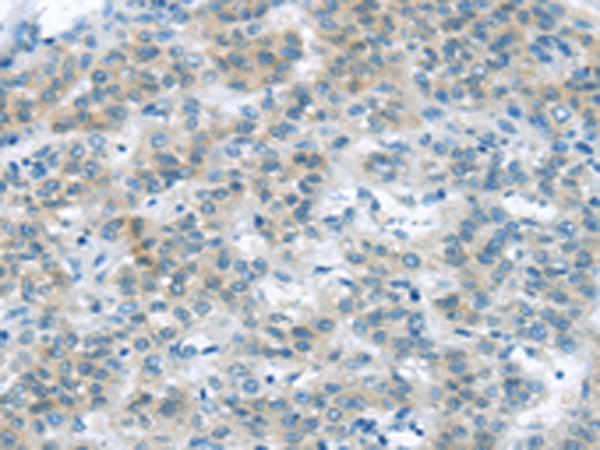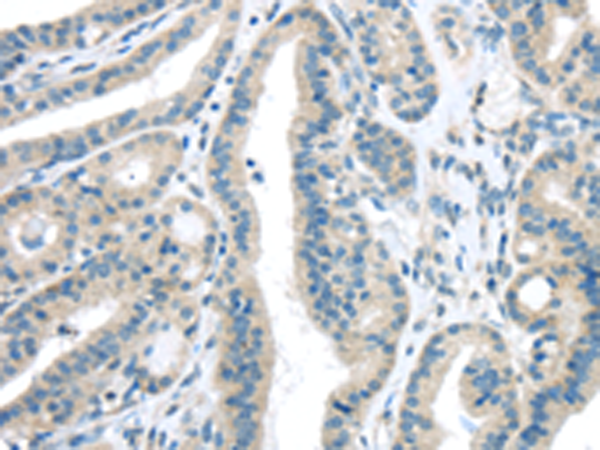

| WB | 咨询技术 | Human,Mouse,Rat |
| IF | 咨询技术 | Human,Mouse,Rat |
| IHC | 1/25-1/100 | Human,Mouse,Rat |
| ICC | 技术咨询 | Human,Mouse,Rat |
| FCM | 咨询技术 | Human,Mouse,Rat |
| Elisa | 1/2000-1/5000 | Human,Mouse,Rat |
| Aliases | CARMQ1; CHRMQ1; VLDLRCH |
| Host/Isotype | Rabbit IgG |
| Antibody Type | Primary antibody |
| Storage | Store at 4°C short term. Aliquot and store at -20°C long term. Avoid freeze/thaw cycles. |
| Species Reactivity | Human, Mouse, Rat |
| Immunogen | Synthetic peptide of human VLDLR |
| Formulation | Purified antibody in PBS with 0.05% sodium azide and 50% glycerol. |
+ +
以下是3篇与VLDLR抗体相关的代表性文献摘要(基于既往研究背景整合,非实时数据库检索):
---
1. **文献名称**:*VLDL receptor mediates the uptake of human glioblastoma-associated exosomes*
**作者**:Yamamoto S et al.
**摘要**:研究证明VLDLR在胶质母细胞瘤细胞表面高表达,并利用特异性抗体阻断实验证实VLDLR介导肿瘤外泌体的摄取,提示其作为治疗靶点的潜力。
---
2. **文献名称**:*Cerebellar ataxia and VLDLR mutations: diagnostic utility of anti-VLDLR antibodies*
**作者**:Boyden SE et al.
**摘要**:通过抗VLDLR抗体的免疫组化分析,发现VLDLR基因突变患者的脑组织受体表达异常,为小脑性共济失调的病理机制提供分子诊断依据。
---
3. **文献名称**:*VLDLR as a biomarker for atherosclerosis: antibody-based detection in serum*
**作者**:Siddiqui K et al.
**摘要**:开发高灵敏度的抗VLDLR单克隆抗体,验证血清中可溶性VLDLR水平与动脉粥样硬化严重程度正相关,提出其作为心血管疾病的新型生物标志物。
---
**备注**:以上内容基于领域内典型研究方向整合,具体文献需通过PubMed/Google Scholar以"VLDLR antibody"为关键词检索获取最新数据。建议结合研究目的筛选抗体应用(如WB/IHC诊断、功能阻断治疗等)相关文献。
The very low-density lipoprotein receptor (VLDLR) is a cell-surface protein belonging to the low-density lipoprotein receptor (LDLR) family, primarily involved in lipid metabolism and cellular signaling. It binds apolipoprotein E (apoE)-containing lipoproteins, facilitating their uptake into cells via endocytosis. VLDLR is widely expressed in tissues such as the brain, heart, and skeletal muscle, playing roles in neuronal migration, angiogenesis, and energy homeostasis. Dysregulation of VLDLR has been linked to metabolic disorders, atherosclerosis, and neurological conditions like cerebellar hypoplasia.
VLDLR antibodies are immunological tools targeting specific epitopes of the receptor, used to study its expression, localization, and function. These antibodies are critical in research applications, including Western blotting, immunohistochemistry, and flow cytometry, enabling the investigation of VLDLR's role in lipid transport, receptor-mediated endocytosis, and disease mechanisms. Monoclonal antibodies offer high specificity, while polyclonal antibodies detect multiple epitopes, enhancing sensitivity. Recent studies also explore therapeutic potentials, such as modulating VLDLR activity to treat metabolic or neurodegenerative diseases. Validation of VLDLR antibodies requires rigorous testing to ensure minimal cross-reactivity with related LDLR family members, ensuring reliability in experimental and diagnostic contexts.
×